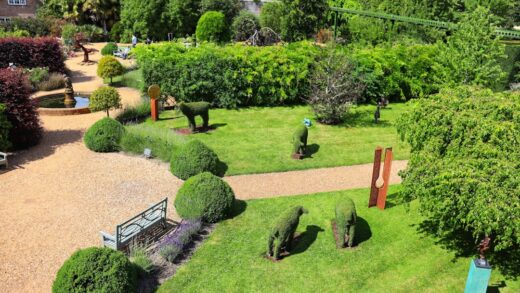Feng-Shui is an ancient Chinese practice that focuses on creating a harmonious environment by balancing the energy flow in a space. It is believed that by arranging and designing your surroundings according to Feng-Shui principles, you can enhance the positive energy and create a sense of peace and tranquility. While Feng-Shui is often associated with interior design, it is equally important to apply its principles to your garden. Your garden is an extension of your home, and by creating a harmonious outdoor space, you can further enhance the positive energy in your life.
Zusammenfassung
- Feng-Shui im Garten ist wichtig, um eine harmonische Atmosphäre zu schaffen.
- Die Bedeutung von Feng-Shui im Garten hat sich im Laufe der Zeit von der reinen Ästhetik hin zu einem ganzheitlichen Konzept entwickelt.
- Elemente wie Wasser, Steine und Pflanzen sind wichtig für einen harmonischen Feng-Shui Garten.
- Du kannst deinen Garten nach den Prinzipien des Feng-Shui gestalten, indem du zum Beispiel auf die Ausrichtung und Anordnung der Elemente achtest.
- Pflanzen wie Bambus, Magnolien und Lotusblumen sind besonders geeignet für einen Feng-Shui Garten.
The Evolution of Feng-Shui in the Garden
The practice of Feng-Shui in the garden has a long history that dates back thousands of years. In ancient China, gardens were considered an important part of one’s living space and were designed with great care and attention to detail. The placement of trees, rocks, and water features was carefully considered to create a harmonious and balanced environment.
Over time, the meaning of Feng-Shui in the garden has evolved. In modern times, gardens are often seen as a place for relaxation and rejuvenation. People now seek to create a peaceful and serene outdoor space where they can escape from the stresses of daily life. As a result, the principles of Feng-Shui have been adapted to suit these needs, with an emphasis on creating a calming and tranquil atmosphere.
Elements for a Harmonious Feng-Shui Garden
In Feng-Shui, there are five elements – wood, fire, earth, metal, and water – that are believed to influence the energy flow in a space. These elements can be applied to your garden to create a harmonious environment. For example, incorporating wooden elements such as trees or wooden furniture can bring the energy of growth and vitality into your garden. Fire elements such as candles or fire pits can add warmth and passion to the space.
Balance and harmony are also important aspects of a Feng-Shui garden. It is important to create a balance between yin and yang energies, which represent feminine and masculine energies respectively. This can be achieved by incorporating both soft and hard elements in your garden, such as soft flowers and hard rocks. By creating a balanced and harmonious environment, you can enhance the positive energy in your garden.
Designing Your Garden According to Feng-Shui Principles
When designing a Feng-Shui garden, there are several tips to keep in mind. First, it is important to create a clear and defined pathway that leads to the main focal point of the garden. This can be a statue, a water feature, or a seating area. The pathway should be free of clutter and obstacles to allow for a smooth flow of energy.
The placement of garden features is also crucial in Feng-Shui. For example, placing a water feature in the north or east area of your garden can enhance the flow of positive energy. Similarly, placing plants with vibrant colors in the south area can bring in the energy of passion and creativity. By carefully considering the placement of each element in your garden, you can create a harmonious and balanced space.
Plants Suitable for a Feng-Shui Garden
Plants play a crucial role in Feng-Shui as they are believed to bring life and positive energy into a space. When choosing plants for your Feng-Shui garden, it is important to consider their symbolism and meaning. For example, bamboo is often associated with good luck and prosperity, while orchids symbolize love and beauty.
In addition to their symbolism, it is also important to consider the placement of plants in your garden. For example, tall plants should be placed at the back of the garden to provide support and protection, while low-growing plants can be placed at the front to create a sense of openness and invitation. By carefully selecting and placing plants in your garden, you can enhance the positive energy and create a harmonious environment.
Improving Energy Flow in Your Garden

Energy flow, or chi, is a central concept in Feng-Shui. It is believed that by improving the flow of energy in your garden, you can enhance the positive energy and create a sense of balance and harmony. There are several tips for improving energy flow in your garden.
First, it is important to keep your garden clean and clutter-free. Remove any dead plants or debris, as they can block the flow of energy. Similarly, it is important to keep pathways clear and unobstructed to allow for a smooth flow of energy.
Second, incorporating curves and flowing lines in your garden can help to improve energy flow. Straight lines can create stagnant energy, while curves can help to keep the energy moving. Consider adding curved pathways or planting beds to create a sense of movement and flow in your garden.
Recommended Colors and Shapes for a Feng-Shui Garden
Colors and shapes also play an important role in Feng-Shui. Each color and shape has its own symbolism and meaning, and by incorporating them into your garden, you can enhance the positive energy.
In Feng-Shui, colors are associated with the five elements. For example, green represents the wood element, while red represents the fire element. By incorporating these colors into your garden, you can bring in the corresponding energies. Similarly, shapes such as circles and squares have their own meanings. Circles represent unity and harmony, while squares represent stability and grounding.
Using Water to Create Positive Energy in Your Garden
Water is an important element in Feng-Shui as it represents wealth and abundance. Incorporating water features such as fountains or ponds in your garden can help to create a sense of calmness and tranquility. The sound of flowing water can also help to mask any unwanted noise from outside sources.
When incorporating water features in your garden, it is important to consider their placement. For example, placing a water feature near the entrance of your garden can help to attract positive energy and invite it into your space. Similarly, placing a water feature in the north or east area of your garden can enhance the flow of positive energy.
Designing Your Terrace or Balcony According to Feng-Shui Principles
Even if you don’t have a large garden, you can still create a harmonious and peaceful outdoor space by applying Feng-Shui principles to your terrace or balcony. When designing your terrace or balcony, it is important to create a sense of balance and harmony.
One tip is to incorporate plants and flowers into your space. Plants not only bring life and positive energy, but they can also help to create a sense of privacy and enclosure. Consider placing potted plants along the edges of your terrace or balcony to create a natural barrier.
Another tip is to create a clear and defined seating area. This can be achieved by using outdoor furniture such as chairs and tables. The seating area should be positioned in a way that allows for a clear view of the surrounding space, while also providing a sense of privacy and protection.
Maintaining Your Feng-Shui Garden
Once you have created a harmonious and peaceful Feng-Shui garden, it is important to maintain it regularly to keep the positive energy flowing. Regular maintenance tasks such as pruning plants, removing weeds, and cleaning water features should be done on a regular basis.
It is also important to pay attention to the changing seasons and adjust your garden accordingly. For example, during the winter months, you may need to protect delicate plants from frost or bring them indoors. Similarly, during the summer months, you may need to provide extra shade or water for your plants.
By maintaining your Feng-Shui garden regularly, you can ensure that it remains a peaceful and harmonious space that enhances the positive energy in your life.
In conclusion, Feng-Shui is an ancient Chinese practice that focuses on creating a harmonious environment by balancing the energy flow in a space. By applying Feng-Shui principles to your garden, you can create a peaceful and tranquil outdoor space that enhances the positive energy in your life.
From choosing the right plants to incorporating water features, there are many ways to create a harmonious Feng-Shui garden. By carefully considering the placement of each element and maintaining your garden regularly, you can ensure that it remains a peaceful and harmonious space.
So why not take some time to design and create your own Feng-Shui garden? By doing so, you can create a peaceful and harmonious outdoor space that brings balance and positive energy into your life.
Hey du! Wenn du dich für Feng-Shui interessierst und deinen Garten umgestalten möchtest, dann habe ich den perfekten Artikel für dich. Schau mal hier: Feng-Shui Garten im Wandel der Zeit: Tipps für die Umgestaltung. In diesem Artikel findest du hilfreiche Tipps und Tricks, wie du deinen Garten nach den Prinzipien des Feng-Shui gestalten kannst. Von der Auswahl der richtigen Pflanzen für das Holzelement bis hin zur harmonischen Raumaufteilung – hier erfährst du alles, was du wissen musst, um deinen Garten in eine Oase der positiven Energie zu verwandeln. Viel Spaß beim Lesen und beim Gestalten deines ganz persönlichen Feng-Shui Gartens!
FAQs
Was ist Feng-Shui?
Feng-Shui ist eine chinesische Lehre, die sich mit der Harmonisierung von Räumen und der Gestaltung von Lebensräumen befasst. Ziel ist es, eine positive Energie im Raum zu schaffen und somit das Wohlbefinden und die Lebensqualität zu steigern.
Was ist ein Feng-Shui Garten?
Ein Feng-Shui Garten ist ein Garten, der nach den Prinzipien des Feng-Shui gestaltet wurde. Dabei geht es darum, eine harmonische und ausgewogene Atmosphäre zu schaffen, die den Energiefluss im Garten fördert und somit das Wohlbefinden steigert.
Wie gestaltet man einen Feng-Shui Garten?
Ein Feng-Shui Garten sollte nach den fünf Elementen gestaltet werden: Holz, Feuer, Erde, Metall und Wasser. Dabei sollten die Elemente in einer ausgewogenen Balance zueinander stehen. Auch die Platzierung von Pflanzen, Steinen und Wasser spielt eine wichtige Rolle.
Welche Pflanzen eignen sich für einen Feng-Shui Garten?
Für einen Feng-Shui Garten eignen sich vor allem Pflanzen, die eine positive Energie ausstrahlen und eine harmonische Atmosphäre schaffen. Dazu gehören beispielsweise Bambus, Magnolien, Rosen und Lavendel.
Wie kann man einen bestehenden Garten in einen Feng-Shui Garten umgestalten?
Um einen bestehenden Garten in einen Feng-Shui Garten umzugestalten, sollte man zunächst eine Analyse des Gartens durchführen und die vorhandenen Elemente in eine ausgewogene Balance bringen. Dabei können auch Veränderungen in der Platzierung von Pflanzen, Steinen und Wasser vorgenommen werden.
Welche Vorteile hat ein Feng-Shui Garten?
Ein Feng-Shui Garten kann das Wohlbefinden und die Lebensqualität steigern, da er eine harmonische und ausgewogene Atmosphäre schafft. Zudem kann er auch das Immunsystem stärken und Stress reduzieren.













